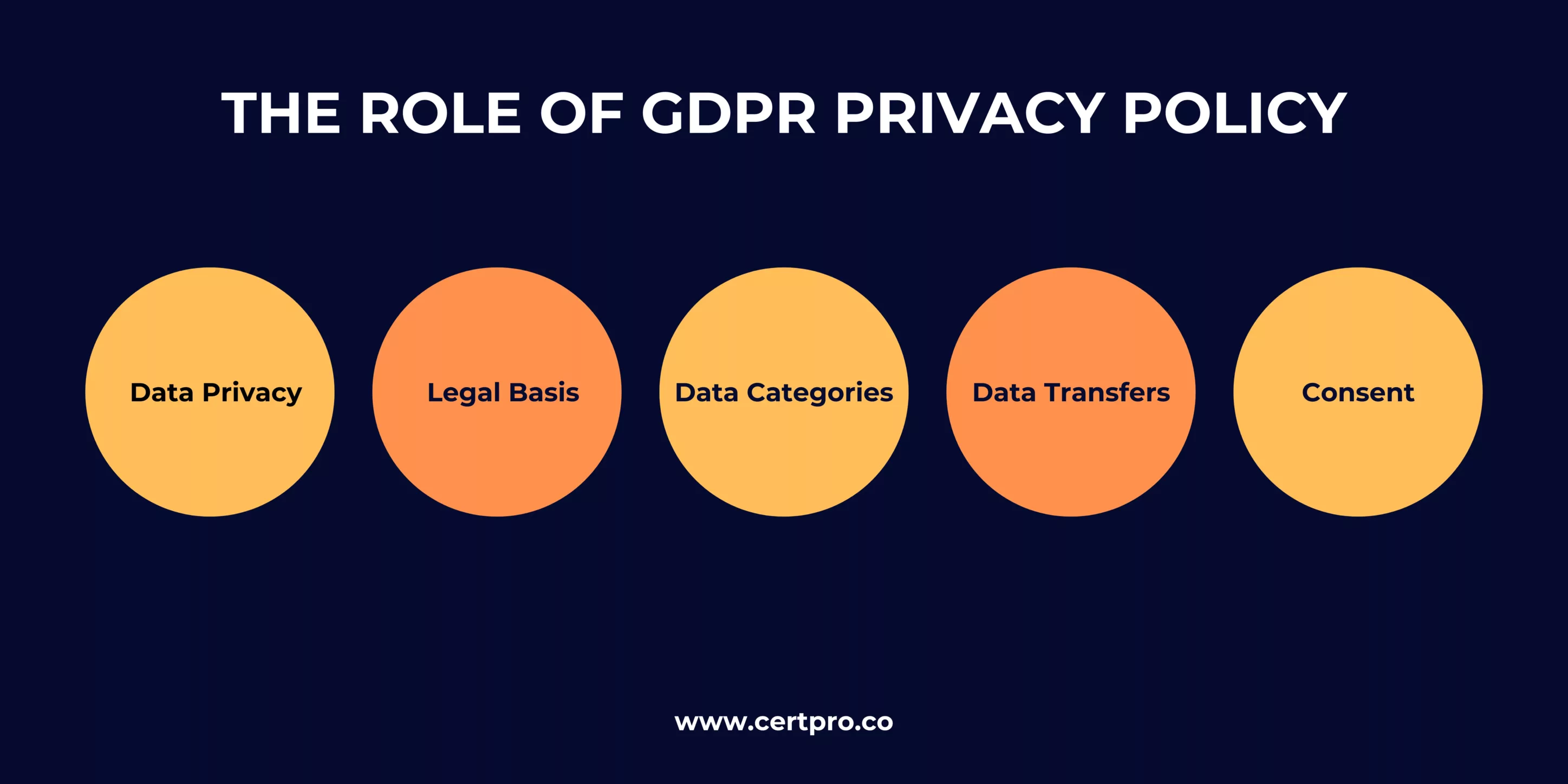The European Union (EU) enacted the General Data Protection Regulation (GDPR) to protect individuals’ personal data. Its principal goal is to empower individuals by giving them more control over their personal data while implementing strict rules for organizations that handle such data. The GDPR Privacy Policy is based on essential principles such as the requirement for explicit consent when collecting personal information, the right of individuals to access and correct their data, and the right to be erased, which requires the deletion of personal data upon request.
As data privacy remains a top priority in our digital age, the General Data Protection Regulation Privacy Policy remains an essential step in changing data protection laws and practices around the world. Non-compliance with the Privacy Policy can result in heavy penalties, making strict observance mandatory for enterprises worldwide that process the data of EU citizens. The global impact of the Privacy Policy has prompted an update in how organizations manage data privacy, emphasizing transparency, responsibility, and the preservation of individual rights.
OVERVIEW OF GDPR PRIVACY POLICY
The European Union (EU) implemented the General Data Protection Regulation (GDPR), a comprehensive privacy law, in May 2018. Its goals were to safeguard the personal information of EU individuals and alter how businesses handle and use data. Due to the fact that it applies to any company that gathers or processes data from EU citizens, the GDPR privacy policy has had a significant influence on enterprises everywhere.
Transparency is one of the guiding principles of GDPR. Organizations are expected to provide individuals with clear and understandable privacy rules that explain how their data will be used.
Consent is another important factor. GDPR requires that organizations seek individuals’ explicit and informed consent before collecting their data. Consent forms should be easily accessible and separate from other terms and conditions. Individuals are also given specific rights about their data under the General Data Protection Regulation privacy policy, including the ability to access, update, and delete their records. Organizations are required to fulfill these requests as soon as possible. The GDPR carries severe consequences, including significant fines, for non-compliance. As a result, businesses everywhere have had to modify their data practices to comply with GDPR regulations. This entails putting in place strong data protection policies, selecting data protection officers, and carrying out frequent risk analyses.
Transparency, permission, and individual rights when it comes to personal data have received a lot of attention as a result of the GDPR privacy policy, which has had an influence on organizations throughout the world.
THE ROLE OF GDPR PRIVACY POLICY
The General Data Protection Regulation (GDPR) is an important framework in the digital world that aims to protect personal information within the European Union. It provides pervasive guidelines and requirements for enterprises that process or store personal data, ensuring secure data handling. GDPR compliance goes beyond legislative compliance by improving data security, protecting privacy rights, and adapting to data-centric technologies. GDPR compliance is vital for various reasons.
- Data Privacy: The GDPR ensures that individuals have control over their personal data. Compliance encourages transparency, permission, and the right to be discarded, enhancing data privacy.
- Legal Basis: Indicate the legal basis for processing personal data, such as consent, contractual necessity, legal obligations, legitimate interests, or vital interests.
- Data Categories: Describe the categories of personal data being processed, such as names, contact information, or sensitive data like health information.
- Data Transfers: If data is transferred outside the EU, explain the safeguards in place to ensure an adequate level of protection.
- Consent: If relying on consent for data processing, explain how individuals can give and withdraw consent.
GDPR is a crucial safeguard for personal data in the digital age, enabling secure processing and empowering individuals with data control. It strengthens legal obligations, builds confidence, and establishes a global data protection standard, lowering the risk of data breaches and improving overall security.

WHY IS PRIVACY POLICY IMPORTANT?
The General Data Protection Regulation (GDPR) requires that organizations managing the personal data of EU citizens or operating in the EU have a privacy policy in place. This policy is essential to complying with the GDPR. The GDPR defines several key data protection principles that serve as the foundation for data privacy and security.
- Legal Requirement: In many jurisdictions, having a privacy policy is a legal requirement, especially when an organization collects and processes personal data. Failure to comply with these requirements can result in legal consequences, including fines and penalties.
- Transparency: A privacy policy provides transparency to individuals regarding how their personal data is collected, processed, and used. This transparency builds trust with customers and users.
- Data Security: It outlines the security measures in place to protect personal data, assuring individuals that their data is handled securely.
- Third-Party Relationships: When an organization shares data with third parties (e.g., vendors or service providers), the privacy policy discloses these relationships, assuring individuals of data protection when their information is shared.
- Competitive Advantage: Being transparent and compliant with privacy laws can be a competitive advantage. Customers and users are more likely to trust and engage with organizations that respect their privacy.
The GDPR Privacy Policy is a vital tool for companies within the EU for processing personal data of EU residents, allowing them to adhere to the General Data Protection Regulation. fundamental data protection principles. It establishes transparency and responsibility, focusing on data minimization, trustworthy and fair processing, and the crucial importance of data accuracy. The Privacy Policy, by outlining these principles, not only assures legal compliance but also develops trust with individuals by supporting responsible and ethical data handling methods, establishing a culture of privacy and data protection within enterprises.
GDPR and Third-Party Data Sharing: What You Need to Know
A fundamental aspect of any privacy policy is to inform website users about the data collection practices. This is vital to ensure users are aware of the information being gathered and whether it aligns with their comfort level regarding data sharing. The nature of data collection can vary widely between websites, from minimal details like email addresses for mailing lists to comprehensive personal information such as names, addresses, payment data, and locations for various purposes. The key is to communicate clearly what data is being collected.
Data collection methods also differ among websites. Some websites collect minimal data, like names and addresses, exclusively for online transactions, while others gather similar data but share it with third parties for marketing purposes. It’s crucial to articulate how the collected information will be used post-collection to establish transparency.
The purpose of data collection must be explicitly stated. For instance, collecting names and addresses may serve the purpose of facilitating online transactions on one website, while on another, the same data could be sold to third parties for advertising purposes. Transparency about data utilization is paramount.
Secure data maintenance is critical. Personal data should be stored securely, with limited access only to authorized individuals. This is essential to prevent data breaches, which have had severe consequences in recent years, leading to legal and financial liabilities. Protecting sensitive user data is a responsibility that cannot be overlooked.
In the context of GDPR privacy, disclosing personal data to third parties comes with stringent requirements. Organizations must establish a lawful basis for such disclosures, which could include explicit consent, contractual necessity, legal obligations, or legitimate interests. Transparency is essential, with detailed privacy policies outlining recipients, purposes, and lawful bases for data sharing.
In GDPR, various cookie categories exist, each requiring user consent and compliance with data processing rules. These include necessary cookies (for site operation), functional cookies (enhancing user experience), performance cookies (tracking site usage), targeting and advertising cookies (for personalized ads), third-party cookies (embedded services), session cookies (temporary), and persistent cookies (long-lasting).
GET PROFESSIONAL ASSISTANCE FOR GDPR COMPLIANCE
CertPro is a recognized pioneer in GDPR compliance solutions, providing a full variety of services to assist organizations in achieving and maintaining GDPR compliance. Our experience includes developing GDPR privacy and aiding with GDPR policy development. We execute comprehensive evaluations and exact audits to uncover any gaps or non-compliance issues in an organization’s data processing procedures, thereby ensuring organizations’ conformity to GDPR privacy requirements. CertPro’s expertise truly shines in its ability to guide organizations through the complex process of GDPR compliance, ensuring they have solid GDPR policies in place to satisfy the demands of the General Data Protection Regulation.
FAQ
HOW DOES GDPR COMPLIANCE AFFECT DATA PRIVACY FOR INDIVIDUALS?
GDPR compliance greatly improves data privacy for individuals. It gives them more control over their personal data by ensuring clear permission for data collection and the right to access, modify, or want deletion of their data. Individuals are empowered as their privacy rights are protected.
WHO DOES THE GDPR APPLY TO?
The GDPR applies to any organization, regardless of its location, that processes the personal data of individuals within the European Union (EU). The GDPR applies to any entity, regardless of location, that processes the personal data of EU residents.
WHAT ARE THE CONSEQUENCES OF GDPR NONCOMPLIANCE?
Noncompliance with the GDPR (General Data Protection Regulation) can result in significant fines. For less serious violations, fines of up to €10 million, or 2% of global yearly revenue, may be imposed.
IS IT NECESSARY FOR SMALL ENTERPRISES TO COMPLY WITH GDPR?
GDPR requires businesses of all sizes to comply if they handle the personal data of EU citizens. While there are some exceptions for extremely small businesses, the general norm is that GDPR requirements must be followed.
WHAT IS DATA BREACH NOTIFICATION UNDER GDPR?
GDPR data breach notification is a regulatory requirement that requires enterprises to notify relevant supervisory authorities and impacted individuals as soon as a data breach occurs.

About the Author
GANESH S
Ganesh S, an expert in writing content on compliance, auditing, and cybersecurity, holds a Bachelor of Arts (BA) in Journalism and Mass Communication. With a keen eye for detail and a knack for clear communication, Ganesh excels in producing informative and engaging content in the fields of compliance, auditing, and cybersecurity, with particular expertise in ISO 27001, GDPR, SOC 2, HIPAA, and CE Mark.
HOW TO CONDUCT A GDPR AUDIT FOR MY BUSINESS?
The General Data Protection Regulation (GDPR) is vital for today's digital landscape. It is a cornerstone for safeguarding people's privacy rights in the European Union (EU). Therefore, organizations dealing with EU residents' data must follow these GDPR rules....
GDPR DATA BREACH NOTIFICATION: THE ULTIMATE GUIDELINE FOR SECURING DATA
Modern businesses require incorporating personal data protection strategies to ensure customer satisfaction and business growth. In this respect, the European Union's General Data Protection Regulation (GDPR) sets strict standards for maintaining data security....
GDPR Compliance Software: Boosting Business Efficiency
Handling large amounts of personal data has become a significant concern in today's digital landscape, necessitating a thorough understanding of the intricate legal framework, particularly within the European Union. An essential piece of legislation in this regard is...




